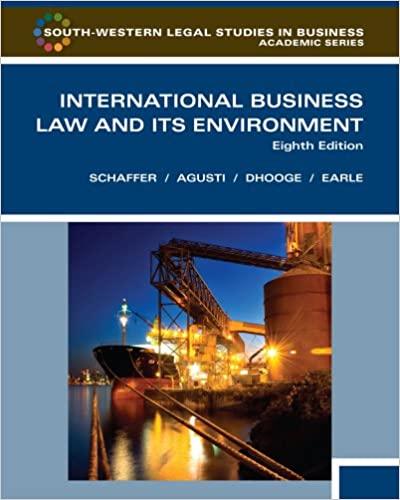Question
Investor owns common (voting) stock in Corporation. Corporation is run by a somewhat surly CEO and Chairman of the Board of Directors, M. M and
Investor owns common (voting) stock in Corporation. Corporation is run by a somewhat surly CEO and Chairman of the Board of Directors, M. M and his fellow board members are uninterested in shareholder input, and refuse to call and hold regular shareholder meetings because, as they explain, "Shareholder meetings are a waste of time and money." Investor would like to sue. You are advising her. Which of the following is the best advice you could give her?
Group of answer choices
a. Investor should file a direct suit against the corporation, to extract a remedy for harm to the corporation, as opposed to a derivative suit, which would seek a remedy for harm to the shareholders.
b. Investor should file a derivative suit, on behalf of the corporation, against the stakeholders for breach of their fiduciary duties.
c. Investor should not file a direct suit, because it requires a 5% shareholding; a derivative suit, which does not require the ownership of the actual shares, is a better idea for her.
d. Investor should file a direct suit, to enforce her right to vote, and not a derivative suit, which would be filed on behalf of the corporation.
Corporation has 5 directors. After decades of profitable operations, Corporation begins to suffer heavy losses. Shareholders of Corporation file a derivative suit against the directors, which focuses on the behavior of three directors. Director 1 has an ethical objection to the business of Corporation and has been making decisions with an actual intent to do harm to Corporation. Director 2 could not care less about Corporation and has behaved with a lack of due care in fulfilling his responsibilities but without any malevolent intent. Director 3 is very busy with another job, and has been deliberately shirking his responsibilities in an intentional dereliction of his duties as a director. Which of Directors 1, 2 and/or 3 has/have failed to act in good faith such that they may be subject to liability in the shareholder derivative suit?
Group of answer choices
a. Directors 1 and 2 only.
b. Directors 1, 2, and 3.
c. Directors 1 and 3 only.
d. Director 1 only.
Step by Step Solution
There are 3 Steps involved in it
Step: 1

Get Instant Access to Expert-Tailored Solutions
See step-by-step solutions with expert insights and AI powered tools for academic success
Step: 2

Step: 3

Ace Your Homework with AI
Get the answers you need in no time with our AI-driven, step-by-step assistance
Get Started


